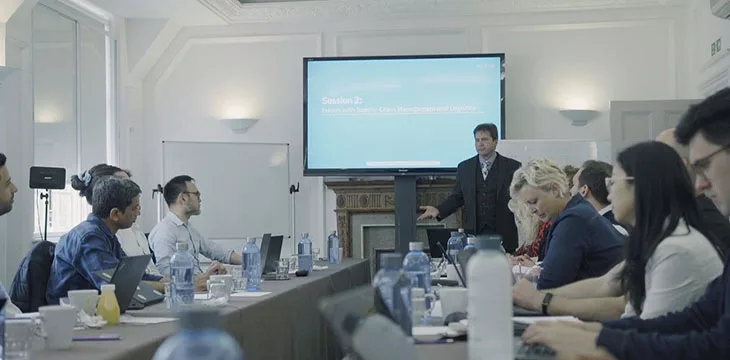Dr. Craig Wright‘s fifth The Bitcoin Masterclasses returned to London May 17-18, with a theme of EDI logistics and tracing goods. The masterclass is free for in-person and online attendees, with plenty of opportunities for direct interaction with Dr. Wright, group breakouts and networking.
“I think Craig does really well with specific setups like this, that allow him to go off on long-form discussions about a lot of stuff, where in short form he’s often misunderstood,” shared BSV developer Jad Wahab.
“This gives him the opportunity to explain a lot of things, and it gives us the opportunity to ask questions about things we’re unsure about,” he said.
“It’s just a really good experience to exchange ideas and discuss a lot of things related to what we are working on and trying to see the broader vision, the longer theoretical vision that Craig’s always talking about, and then trying to bring that to reality,” Wahab added.
EDI stands for “electronics data interchange,” which, according to nChain‘s Research Director Alessio Pagani, is a protocol that allows for data to be created in a format that is interchangeable between businesses and describes how this data should be transmitted between businesses.
“With Bitcoin, actually, you gain a lot of efficiency and a lot of security, and so we are seeing how we can improve those businesses by embedding Bitcoin in EDI,” explained Pagani.
Dr. Wright spoke in detail on the idea of supply and supply chain and challenged attendees to come up with ways how to improve current systems. He pointed out that while EDI is still widely used, along with other similar messaging formats such as eUCP, they are actually “very simple” to code into Bitcoin.
“Getting people to think about how we might do that is important, and it’s not as difficult as people make it out to be. Once you actually structure all of this information, then it’s doable, and an NFT, rather than having a Bored Ape, it could actually have useful information,” Dr. Wright explained.
Throughout the two days in London, Dr. Wright emphasized the goal is not trying to get businesses to replace their current systems; rather, the goal is to help systems run more efficiently by plugging into Bitcoin.
nChain’s Delivery Manager, Mike Rae, was happy to elaborate on this concept.
“Rather than focusing on building products from scratch in organizations, industries, they may not wish to change the way they operate. Large warehouse chains and supermarkets, they’re not going to train 100,000 of their managers to use a new system just because it’s funky,” he said.
“We need to plug into what they currently use; organizations wouldn’t need to change the way they work. There’s just a minor tweak on the back end of their existing systems, and then they could be gaining all the benefits of Bitcoin,” he said.
Pagani echoed Rae’s sentiments and said we don’t want to recreate something that already exists. We want to improve it.
“By embedding Bitcoin in these EDI systems, what you do is basically use this transparent, distributed ledger to store information so that it’s transparent, you can guarantee the integrity of the data, the security of the data,” he said.
“And this means that all the parties involved in an exchange can gain those advantages by default by integrating blockchain in their design, without changing too much,” Pagani added.
Alison Gatoff, Technical Architect at nChain, said one of her key takeaways from the masterclass was how the peer-to-peer functionality of Bitcoin enables even smaller companies who cannot afford huge, fancy systems to enjoy more efficiency.
“What we’re trying to do is link everything together in such a way that it doesn’t become authoritarian, that it becomes peer to peer, because we are in that stage where everything is already tracing and monitoring,” she said.
“How do you make sure that when you’re doing those things that you can provide an equivalent service not to big corporations, but to individuals without those kinds of resources, but then can operate as small bubbles temporarily? Very much the gig economy,” she said.
“Long-term relationships are also feasible, but 1 to 1 without the overhead of a lot of costs going to third parties, which quite frankly isn’t necessary today when you use blockchain and public key cryptography,” Gatoff added.
In addition to walking away with valuable insights, Gatoff also had amazing things to say about Dr. Wright’s teaching style, indicating she really enjoys listening to what he has to say and that he articulates well.
“His ideas are very broad, and he allows opportunity to make a contribution and think about it from lots of different perspectives, and I find that incredibly refreshing. He’s just very good at communicating,” she said.
“He comes across so well in person. It’s really, really refreshing. I really have enjoyed it,” Gatoff added.
Watch: Logistics, supply chain management & stock control
New to blockchain? Check out CoinGeek’s Blockchain for Beginners section, the ultimate resource guide to learn more about blockchain technology.










